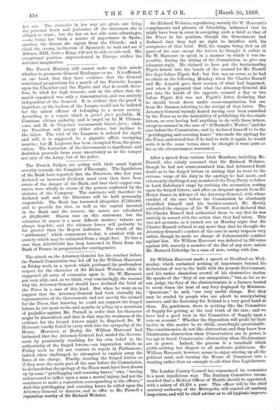Sir Richard Webster, repudiating warmly Sir W. Harcourt's compliments and
phrases of friendship, intimated that he might have been in error in accepting such a brief as that of the Times in his position, though the Government had declared that they had no right to interfere with his acceptance of that brief. Still, his tongue being tied on all parts of the case except the letters, he thought it unfair in Sir W. Harcourt to speak in a manner to which it was im- possible, during the sitting of the Commission, to give any adequate reply. He claimed to have put the incriminating Pigott letters into the hands of the counsel for Mr. Parnell five days before Pigott fled ; but this was an error, as he had to admit on the following Monday, when Sir Charles Russell and Mr. Asquith gave their version of what had happened, and when it appeared that what the Attorney-General did put into the hands of the opposite counsel a day or two- before Pigott fled was not Pigott's letter declaring that he should break down under cross-examination, but one from Mr. Soames referring to the receipt of that letter. The Attorney-General warmly denied having ever been consulted by the Times as to the desirability of publishing the fac-simile letters, or ever having had anything to do with those letters, except as counsel in the case of " O'Donnell v. Walter," and the case before the Commission ; and he declared himself to be the "pettifogging and cozening knave " who made the apology for the Times, and stated that if he had to write it again, he would write it in the same terms, since he thought it went quite as far as the circumstances warranted.


















































 Previous page
Previous page